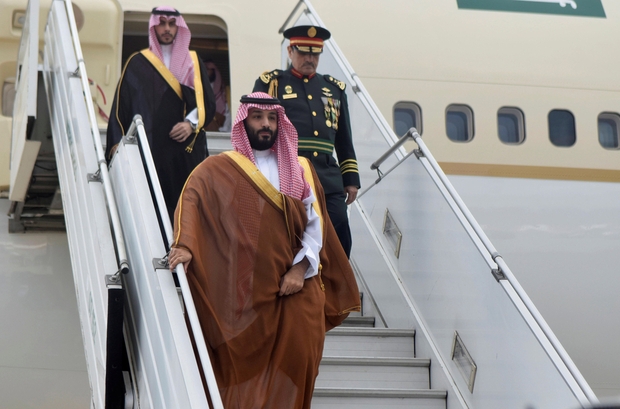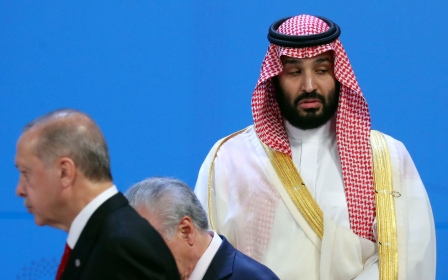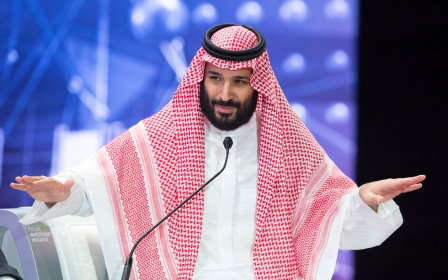Saudi crown prince in Jordan: What citizens, political parties, media really think

AMMAN - There is a popular saying in Jordan: "Silence is a sign of acquiescence." The phrase is used to describe a bride who wants to signal her agreement to marry without saying a word.
Given the silence on the streets of Jordan last week ahead of an expected visit to the kingdom this week by Saudi Crown Prince Mohammed bin Salman, some might think Jordan is Saudi Arabia's willing bride.
After all, MBS was greeted on Tuesday in Tunisia by thousands of protesters, wielding saws covered in fake blood and posters saying "Go away assassin". He did not stop in Morocco after a reported snub by King Mohammed VI. And he touched down for the G20 in Argentina while a judge was examining whether to pursue him over war crimes.
But despite the relative quiet in Jordan, a broad spectrum of activists, political parties and journalists who have formed a coalition tell Middle East Eye they rejected MBS's visit to their kingdom. The crown prince was reportedly set to arrive on Monday, but reports emerged late in the day that he had delayed his visit.
[Jordanians] fear Mohammed bin Salman and the UAE's Mohammad bin Zayed the most because they note that they deal in a thuggish way with all the countries that need their financial help
- Veteran Jordanian journalist Lamis Andoni
Protests had yet to materialise, the coalition members said, because those who would speak out fear a Jordanian law that criminalises the harming of Jordan's interests and, more specifically, the criticism of allies. Many, too, may work or have relatives working in Saudi Arabia or the United Arab Emirates, and fear repercussions.
Those who object say they oppose Saudi Arabia's support of policies that harm the Palestinian cause, the kingdom's leading role in the coalition fighting rebel Houthis in Yemen, and the killing in early October of journalist Jamal Khashoggi. The timing, said one, would be "inappropriate".
"The investigation of the death of Khashoggi is not over, and there are specific accusations that Prince Mohammed is involved in it," Murad Adaileh, secretary general of the Islamic Work Front, Jordan's largest political party.
"There is also general unhappiness about the Saudi position regarding the case of Palestine, and we reject any Saudi pressure of Jordan in this regard."
Deteriorating diplomacy
Relations between Jordan and Saudi have been deteriorating since last year, when Riyadh was ready to surrender the Palestinian right of return in exchange for putting Jerusalem under international sovereignty as part of the Trump administration's so-called "deal of the century".
That deal would have compromised the special status Jordan has as the custodian of Muslim and Christian holy sites in the city. It also would have been hugely problematic for Jordan's population, 65 percent of which are Palestinian, mostly from the occupied West Bank.
Israeli commentators have since suggested that Saudi Arabia could replace Jordan's patronage of the holy sites. In an interview with Saudi-funded newsite Elaph in January, Israeli opposition leader Isaac Herzog praised Saudi Arabia and MBS, and called for a special role for Saudi Arabia overseeing the sites.
Said Thiab, secretary general of the leftist al-Wihda Party and a spokesman for the coalition against the MBS visit to Jordan, said the group doesn't reject the crown prince but rather Saudi's policies in the region which he has championed.
"It is a position of opposition to Saudi policies in relations to normalisation [with Israel] in which MBS has played a role by giving Arabs the green light for visits to Oman and Bahrain to welcome Israeli PM [Benjamin] Netanyahu," Thiab said.
He said they also oppose "what Saudis are doing in terms of massacres in Yemen, the Arab Nato which was established by Saudis, and the search for another enemy as an alternative to Israel with Iran being pictured as the enemy".
Khashoggi's murder in the Saudi consulate in Istanbul, he added, was an "ugly crime" that pushed Jordanians of all walks of life to reject the visit.
Thiab said he could not predict the size of the groundswell of opposition, but suffice to say that Jordanians do not differ from the Arab street, which rejects this.
"But there is oppression being practiced on activists using laws, nevertheless, for us in the coalition of parties that don't welcome this visit," he said.
Intelligence services in Jordan tend to suppress demonstrations through arrests, and protesters especially fear the text of article 118 of the penal code, which could result in their imprisonment under the charge of "hurting Jordanian interests and ruining the relations with a friendly country".
In a bind
Jordan has officially supported the Saudi narrative since the beginning of the Khashoggi affair, with government spokeswoman Jumana Ghnaimat describing reports of his murder in the Saudi consulate in Istanbul as "baseless rumours" in a campaign against the kingdom.
After the government admitted Khashoggi was murdered in the consulate, Ghnaimat said Jordan supported the Saudi murder investigation.
Jordanian journalists like Basel Okor, the publisher of Jordanian website Jo24, said that like his peers around the region he rejected Mohammed bin Salman's visit.
"We as Jordanian journalists are not happy with the stand of Jordan from the case of Khashoggi, and we have reservations as to the visit of bin Salman, which we consider inappropriate because we don't accept the brutal attack against any journalist," he said.
But veteran Jordanian journalist Lamis Andoni said Jordan finds itself in a bind as a result of the kingdom's economic woes.
On Friday, hundreds of Jordanians protested in central Amman in the first demonstration against a new, International Monetary Fund-backed tax bill that parliament passed in November.
In June, the kingdom saw a week of angry protests over austerity measures that were imposed as a condition of a $732m loan from the IMF in 2016.
At the time, Saudi Arabia, Kuwait and the United Arab Emirates pledged $2.5bn over five years in financial support for Jordan.
"Jordan fears a confrontation with Saudi Arabia and the UAE because of their vast investments and financial support," she said.
"They fear Mohammed bin Salman and the UAE's Mohammad bin Zayed the most because they note that they deal in a thuggish way with all the countries that need their financial help."
Even if protests don't materialise, Andoni says that all parties in Jordan are at odds with Saudi Arabia.
"I am certain that they have been opposed even before the killing of Khashoggi and other cases, like the kidnapping of the Saudi emirs and taking away their money [in late 2017] and the brutal war in Yemen," she says.
"We notice that he [bin Salman] is trying to get closer to African countries, and he made a new statement that said that Saudi Arabia wants the Arab countries to be in the forefront of the countries of the world," she said.
Andoni characterised his outreach as an attempt to clean up his mistakes, deflect the global pressure he is under, and guarantee his future as king.
New MEE newsletter: Jerusalem Dispatch
Sign up to get the latest insights and analysis on Israel-Palestine, alongside Turkey Unpacked and other MEE newsletters
Middle East Eye delivers independent and unrivalled coverage and analysis of the Middle East, North Africa and beyond. To learn more about republishing this content and the associated fees, please fill out this form. More about MEE can be found here.




